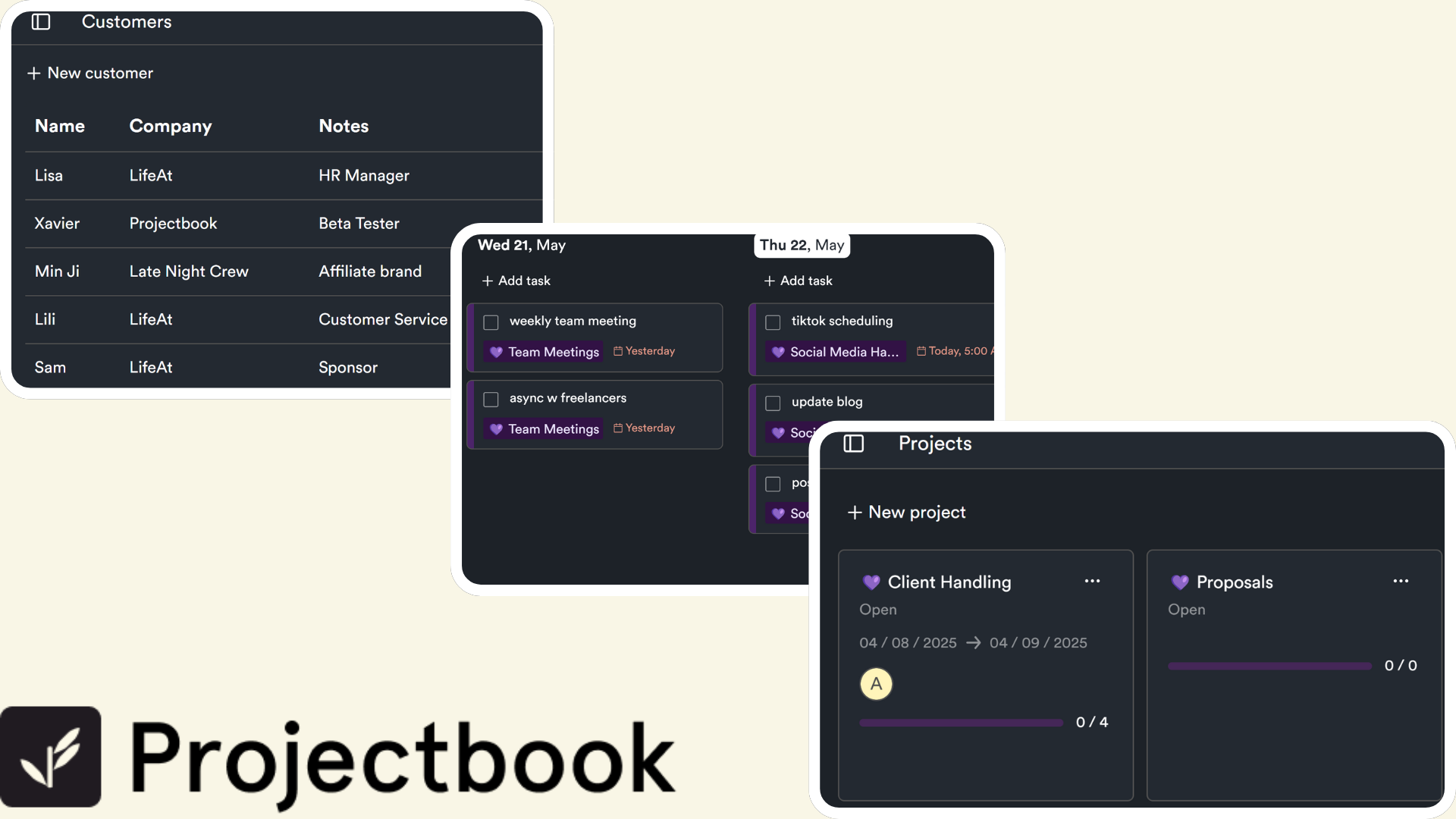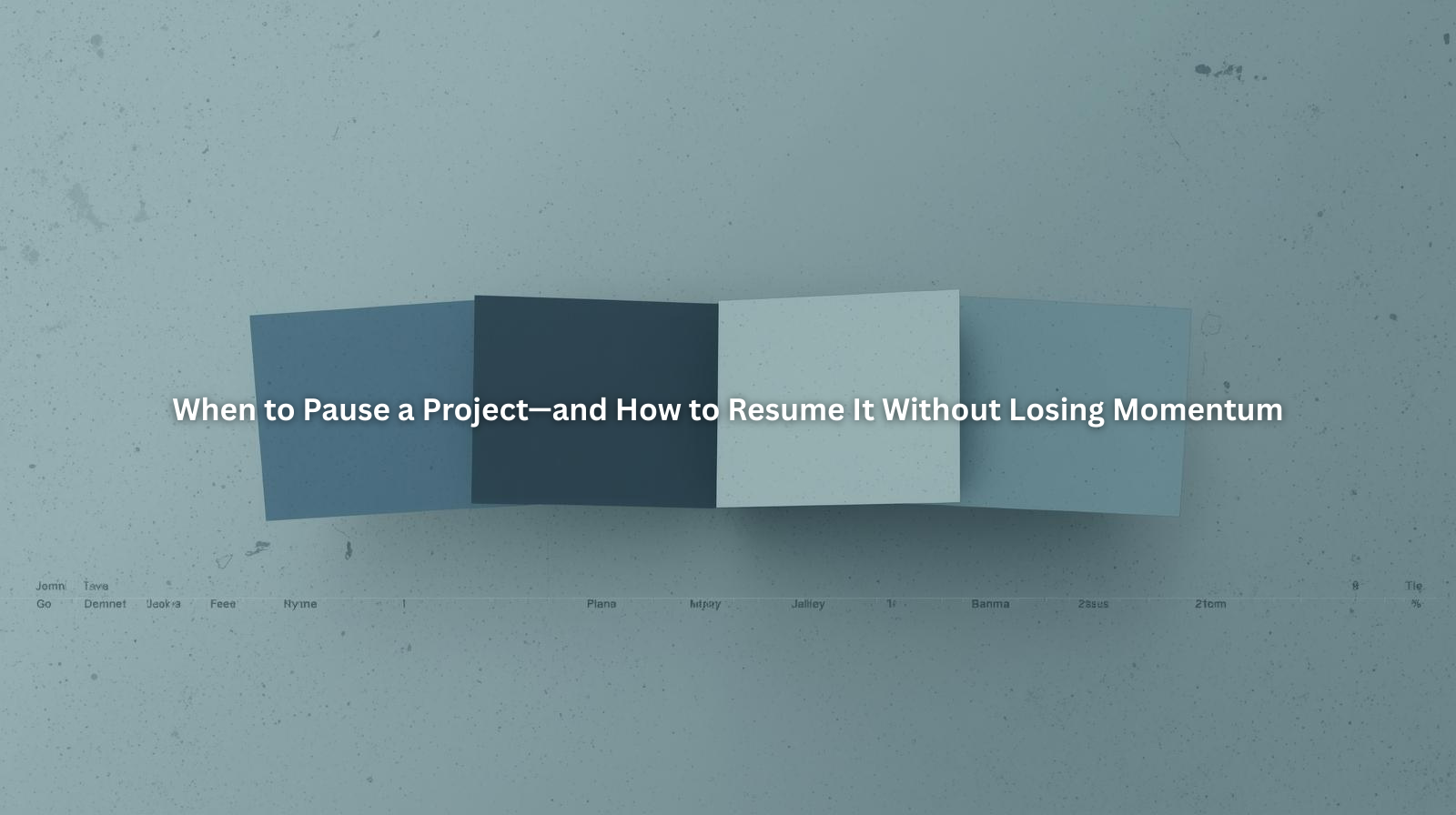The “Second Brain” Strategy for Freelancers: Where to Keep Everything That’s Not Urgent (Yet)
.png)
Table of Contents
- The Freelance Mind: Always Full, Rarely Focused
- What Is a “Second Brain”? (And Why You Need One)
- The Problem With Trying to Remember Everything
- What to Store in Your Second Brain (and What Not To)
- How to Build a Simple Second Brain for Your Freelance Business
- How ProjectBook.co Keeps Your Second Brain Organized—Not Overwhelming
- FAQ: Second Brain Strategy for Freelancers

1. The Freelance Mind: Always Full, Rarely Focused
As a freelancer, your brain is constantly juggling things: project deadlines, client emails, invoices, social content ideas, future service updates, that one email you forgot to send last week, and the newsletter you’d love to write when you have time.
It’s a lot. And if you’ve ever found yourself losing momentum because you’re trying to mentally track too many ideas at once—you’re not alone. The mental load of solo work is real.
That’s where the idea of a “second brain” comes in: a place to put the things you don’t need to think about right now, but still want to remember later.
2. What Is a “Second Brain”? (And Why You Need One)
Coined by productivity thinkers like Tiago Forte, a “second brain” is basically an external storage system for your mind. It’s not just about keeping track of to-dos. It’s about offloading ideas, plans, and half-finished thoughts—so you can clear your mental inbox and stay focused on the work in front of you.
For freelancers, this isn’t a luxury. It’s essential. You wear every hat in your business. If you don’t have a place to store what’s not urgent yet, everything starts to feel urgent now.
A second brain lets you think longer-term. It helps you stay creative. And it ensures that nothing gets lost—no matter how busy your week gets.
3. The Problem With Trying to Remember Everything
When you try to keep it all in your head, two things happen:
- You feel like you’re always forgetting something (because you probably are).
- You struggle to stay present with your current work—because future work is constantly whispering at you.
This low-level mental noise creates stress and steals energy from the task at hand. Even simple things—like writing an invoice or reviewing client feedback—feel harder when your brain is holding onto 20 unrelated tabs.
By giving non-urgent thoughts a safe place to land, you lighten the load. And you make it easier to focus deeply, work efficiently, and access those ideas later—when you actually have the bandwidth to use them.
4. What to Store in Your Second Brain (and What Not To)
Your second brain isn’t a junk drawer. It’s a working library—a place where your ideas, plans, and someday-tasks can live until they’re needed.
Here’s what belongs in there:
- Future service ideas
- Notes from client meetings
- Blog topic brainstorms
- Templates to refine later
- Personal projects you want to start “someday”
- Questions you’re still thinking about
- Bookmarks or quotes you want to revisit
- Repeatable task checklists or client email scripts
Here’s what doesn’t belong:
- Today’s to-do list
- Urgent deadlines
- Tasks that require immediate decisions
- Notes with no context you’ll never use again
Think of it as a creative holding zone. Your current brain handles execution. Your second brain holds potential.
5. How to Build a Simple Second Brain for Your Freelance Business

You don’t need a fancy system. In fact, the simpler it is, the more likely you are to use it.
Start with three core “buckets”:
- To Revisit Later: Ideas and tasks you want to come back to.
- Someday/Maybe: Projects you’re not ready to start but don’t want to forget.
- Templates/Systems: Emails, workflows, checklists, or notes you want to reuse.
These can live in a digital note app, a task manager, or—ideally—a tool you’re already using to run your freelance business.
Review it weekly. That’s the key. Once a week, skim your second brain. Promote anything that’s become relevant. Archive what no longer applies. This keeps it lean, useful, and actionable.
6. How ProjectBook.co Keeps Your Second Brain Organized—Not Overwhelming
Inside ProjectBook, you can create a dedicated “Second Brain” project or workspace just for these non-urgent items. You can tag notes by category (“ideas,” “systems,” “waiting”) and schedule gentle reminders for future-you to review them.
If something becomes actionable, you can move it directly into a client project or timeline—without losing context. No need to rewrite notes or copy tasks between tools.
ProjectBook also lets you track internal projects alongside client work—so you don’t forget to invest in your business while managing everyone else’s. Think of it as your digital desk drawer. Everything has a home. Nothing gets lost.
7. FAQ: Second Brain Strategy for Freelancers
Isn’t this just a note-taking system?
It’s more intentional than that. A second brain stores ideas you’re not acting on yet—so you can stop holding them mentally and return later with clarity.
How often should I check it?
Once a week is ideal. You can make it part of your end-of-week review. That’s when you’ll catch gems, spot new priorities, or let go of what no longer matters.
Won’t this just give me more to manage?
If it’s simple and aligned with your current workflow, it won’t. In fact, it reduces mental load by keeping your mind focused and your ideas safely stored.
How does ProjectBook help with this?
You can store notes, tag future tasks, and house someday-projects in one workspace—then convert them into live projects when you’re ready.

Final Word
You don’t need to do everything right now.
You just need a place to hold what matters—until it’s time.
A second brain helps freelancers stay focused, creative, and calm. It turns “maybe later” into a real system instead of a forgotten idea. And it gives you space to think clearly today… while building a better business tomorrow.
With ProjectBook.co, your second brain is just a few clicks away.
Easy to build. Easy to use. And always ready when you are.


